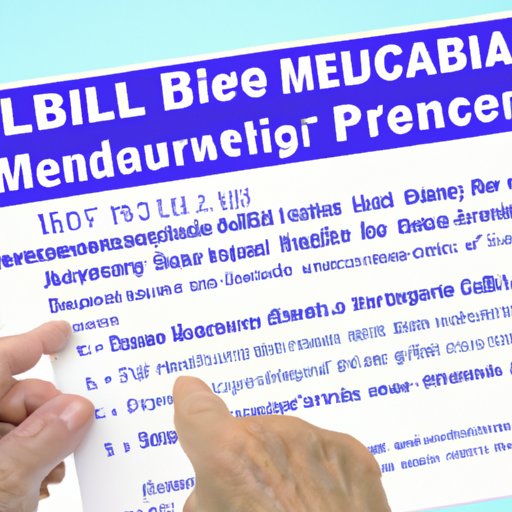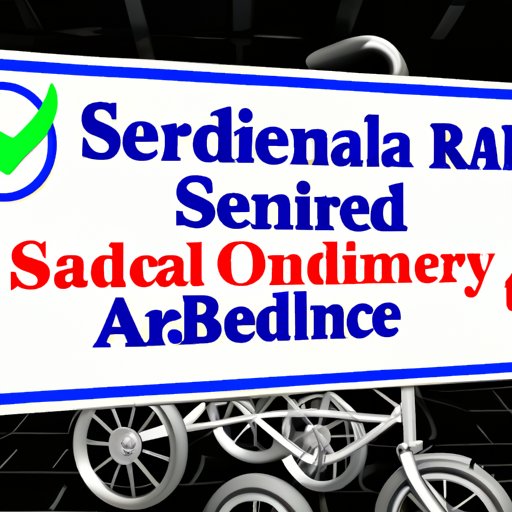Introduction
Medicare is a federal health insurance program that is available to people age 65 and older, as well as certain individuals with disabilities and end-stage renal disease (ESRD). While the program offers a range of benefits, understanding who is eligible for Medicare can be confusing. In this article, we’ll explore the eligibility requirements and provide a comprehensive guide on how to determine if you qualify.
Exploring Medicare Eligibility Requirements
In order to be eligible for Medicare, you must meet certain criteria. Here are some of the key requirements:
Age
The most common way to become eligible for Medicare is by reaching the age of 65. You may also be eligible if you’re under 65 and have been receiving Social Security Disability Insurance (SSDI) for 24 months or more. If you are over 65 and still working, you may be able to delay enrolling in Medicare until you retire.
Disability Status
If you are under 65 and have a disability, you may be eligible for Medicare. The Social Security Administration (SSA) will determine your eligibility based on whether or not you are receiving SSDI benefits. If you are approved, you may be eligible for Medicare even if you are not yet 65 years old.
End-Stage Renal Disease (ESRD)
People with ESRD, or permanent kidney failure, are also eligible for Medicare. To qualify, you must be receiving dialysis treatments or have had a kidney transplant. You may also be eligible if you are a beneficiary of Social Security or Railroad Retirement Board, regardless of age.

What You Need to Know About Medicare Eligibility
Once you have determined that you meet the eligibility requirements, there are a few more things you need to know about Medicare. Here are some important facts:
Medicare Part A and B
Medicare consists of two parts: Part A and Part B. Part A covers hospital care, while Part B covers outpatient services, such as doctor visits and preventive care. Depending on your situation, you may be eligible for both parts or just one.
Special Enrollment Periods
If you are not automatically enrolled in Medicare due to age or disability status, you may be eligible for a Special Enrollment Period (SEP). SEPs allow you to enroll in Medicare outside of the regular enrollment period. SEPs are available to people who are losing employer coverage, individuals who are moving, and those who are returning to the United States after living abroad.
Qualifying for Medicare: A Comprehensive Guide
Now that you know the eligibility requirements, let’s take a look at what you need to do to qualify for Medicare. Here’s a step-by-step guide:
Meeting the eligibility requirements
The first step is to make sure that you meet the eligibility requirements outlined above. This includes being either 65 years of age or older, having a disability, or having ESRD. If you don’t meet these requirements, you may be eligible for a Special Enrollment Period.
Understanding the different enrollment periods
Once you’ve determined that you are eligible for Medicare, it’s important to understand the different enrollment periods. The initial enrollment period (IEP) begins three months before you turn 65 and ends three months after you turn 65. During this time, you can sign up for Medicare Part A and/or Part B. If you miss the IEP, you may be eligible for a SEP.
Who Can Benefit from Medicare?
Medicare is designed to help elderly citizens, disabled individuals, and people with ESRD access the healthcare they need. Here’s a closer look at who can benefit from the program:
Elderly citizens
One of the main groups of people who can benefit from Medicare are elderly citizens. Once you reach the age of 65, you are eligible to enroll in Medicare Part A and/or Part B. This can help cover the cost of hospital care, doctor visits, and other medical expenses.
Disabled individuals
If you are under 65 and disabled, you may be eligible for Medicare. To qualify, you must be receiving SSDI benefits from the SSA. If you are approved, you can enroll in Medicare Part A and/or Part B.
People with ESRD
Another group of people who can benefit from Medicare are those with ESRD. If you are receiving dialysis treatments or have had a kidney transplant, you may be eligible for Medicare Part A and/or Part B. You may also be eligible if you are a beneficiary of Social Security or Railroad Retirement Board, regardless of age.
How to Determine if You’re Eligible for Medicare
Now that you know the eligibility requirements, it’s time to determine if you are eligible for Medicare. Here are some tips for determining your eligibility:
Getting information from Social Security Administration
The first step is to get information from the Social Security Administration. They can help you determine if you are eligible for Medicare based on your age, disability status, or ESRD. They can also answer any questions you may have about the program.
Checking your eligibility online
You can also check your eligibility online. The SSA has an online tool that can help you determine if you are eligible for Medicare based on your age, disability status, or ESRD. This can save you time and help you get the answers you need quickly.
When Can I Start Receiving Medicare Benefits?
Once you have determined that you are eligible for Medicare, you may be wondering when you can start receiving benefits. Here’s what you need to know:
Time frames for enrolling in Medicare
The initial enrollment period (IEP) is the time frame when you can sign up for Medicare Part A and/or Part B. The IEP begins three months before you turn 65 and ends three months after you turn 65. If you miss the IEP, you may be eligible for a Special Enrollment Period.
Coverage start date
Once you’ve enrolled in Medicare Part A and/or Part B, your coverage will begin on the first day of the month after you enroll. For example, if you enroll in January, your coverage will begin on February 1st. Keep in mind that you may have to wait up to six months before you receive your Medicare card.
Conclusion
Medicare is a federal health insurance program that is available to people age 65 and older, as well as certain individuals with disabilities and end-stage renal disease (ESRD). Understanding who is eligible for Medicare can be confusing, but this article provides a comprehensive guide on how to determine if you qualify. It also explains the different enrollment periods and when you can start receiving benefits.
(Note: Is this article not meeting your expectations? Do you have knowledge or insights to share? Unlock new opportunities and expand your reach by joining our authors team. Click Registration to join us and share your expertise with our readers.)
